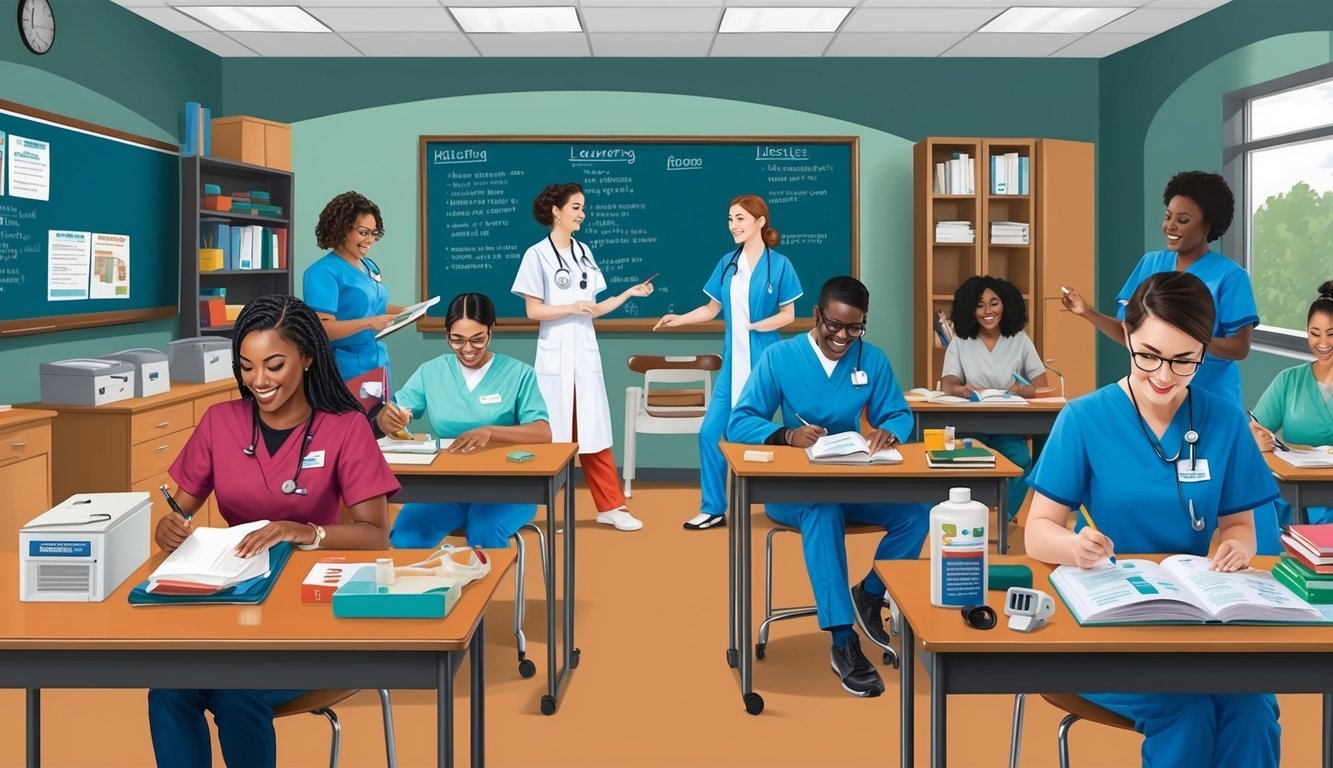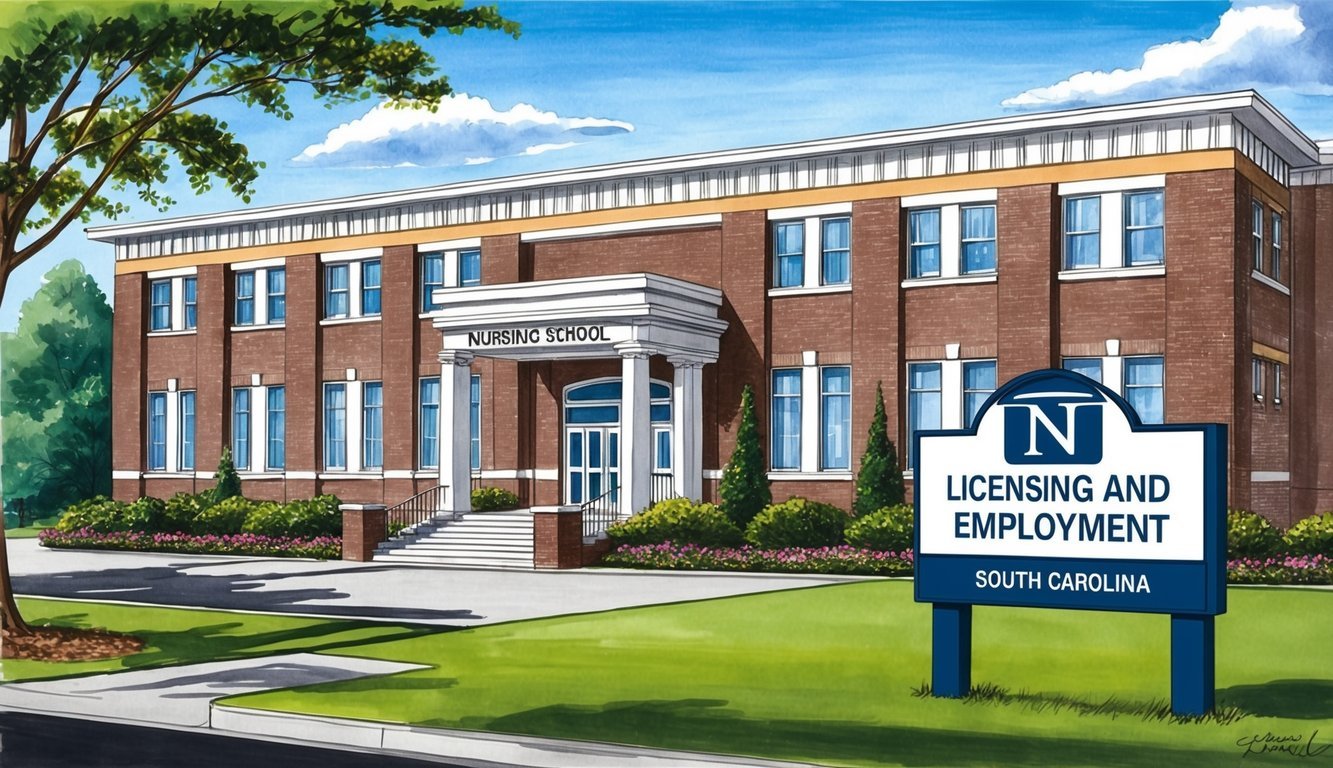If you are considering a career in nursing, South Carolina offers a variety of educational opportunities that can help you achieve your goals.
The state is home to several top-ranked nursing schools providing diverse programs, including Associate’s, Bachelor’s, and Master’s degrees.
These institutions not only equip you with the necessary skills but also prepare you to excel in a rapidly growing field.
Many of these nursing programs emphasize hands-on training and clinical experiences, which are vital for your development as a healthcare professional.
For example, the University of South Carolina College of Nursing and MUSC’s College of Nursing are renowned for their rigorous curricula and supportive learning environments.
These schools focus on producing skilled, compassionate nurses ready to meet the unique healthcare needs of South Carolina’s communities.
As you explore your options, you’ll find that many nursing schools in South Carolina also offer flexible learning formats, including online courses, which can fit into your busy schedule.
Whether you are just starting or looking to advance your career, understanding these programs can guide you toward making an informed decision about your nursing education.
Types of Nursing Programs Available

South Carolina offers a variety of nursing programs to cater to aspiring nurses with different educational backgrounds and career goals.
Understanding your options is crucial for making an informed decision about your nursing education.
Traditional BSN Program
The Traditional Bachelor of Science in Nursing (BSN) program typically spans four years.
This program is designed for students who are entering the nursing field for the first time.
You will complete core nursing courses alongside general education subjects, which may include subjects like anatomy, microbiology, and psychology.
Most programs also include clinical rotations in healthcare settings, providing direct patient care experience.
This well-rounded approach prepares you thoroughly for the NCLEX-RN licensing exam.
Prominent institutions like Clemson University offer this program, ensuring you receive quality education and training.
RN to BSN Program
The RN to BSN program is tailored for registered nurses who wish to elevate their credentials.
This program allows you to complete your BSN typically in one to two years, depending on your prior education and the program’s structure.
You will build upon your existing nursing knowledge while exploring advanced topics such as leadership, community health, and nursing research.
This degree not only enhances your professional opportunities but also equips you with skills for management roles.
Institutions like Lander University provide accredited RN to BSN options that fit working nurses’ schedules.
Accelerated BSN (ABSN) Program
An Accelerated BSN (ABSN) program is an intensive track designed for students holding a non-nursing bachelor’s degree.
Typically lasting 12 to 18 months, this program condenses the BSN curriculum and clinical exposure into a shorter timeframe.
You will need to be fully dedicated and be ready to engage in a fast-paced learning environment.
This program often includes rigorous classroom instruction paired with hands-on clinical experiences.
Students must maintain a high level of performance to succeed.
Many universities in South Carolina offer ABSN programs aimed at preparing you for the NCLEX-RN swiftly and efficiently.
Associate Degree in Nursing
The Associate Degree in Nursing (ADN) program generally takes two years to complete.
This route is often pursued by those seeking quicker entry into the nursing workforce.
You will complete foundational nursing courses and clinical training to prepare for the NCLEX-RN exam.
While an ADN qualifies you for entry-level nursing positions, many graduates choose to pursue a BSN later, enhancing their career advancement opportunities.
Community colleges like Francis Marion University offer ADN programs, focusing on practical nursing skills and patient care.
Graduate Nursing Education
For those aiming to advance their careers further, options such as Master’s Degrees and Doctor of Nursing Practice (DNP) are available.
A Master’s Degree prepares you for specialized roles, such as Nurse Practitioner (NP) or Nurse Educator.
The curriculum typically covers advanced clinical practice, health policy, and patient care management.
The DNP is designed for those looking to assume leadership roles and focuses on practice-oriented nursing education.
It involves extensive training and research that influences healthcare systems.
Established institutions provide these graduate programs, enabling you to scale new heights in your nursing career.
Top Nursing Schools in South Carolina
South Carolina offers several quality nursing programs that cater to aspiring nurses.
The state’s institutions are known for their comprehensive curricula, strong clinical experiences, and innovative research opportunities.
University of South Carolina College of Nursing
The University of South Carolina College of Nursing is a leader in nursing education.
It offers a variety of degree programs, including a Bachelor of Science in Nursing (BSN), Master of Science in Nursing (MSN), and Doctor of Nursing Practice (DNP).
The college emphasizes hands-on learning through its state-of-the-art simulation labs and clinical partnerships with healthcare organizations throughout the region.
Additionally, USC is involved in significant nursing research, contributing to evidence-based practices that enhance patient care.
Medical University of South Carolina
The Medical University of South Carolina (MUSC) has an esteemed nursing program recognized nationally for its excellence.
MUSC offers a BSN program, as well as advanced degrees like the MSN and DNP.
With a strong emphasis on interprofessional education, MUSC prepares you for collaborative practice in diverse healthcare settings.
The school also engages in extensive nursing research, ensuring its graduates are well-prepared to address healthcare challenges.
Clemson University School of Nursing
Clemson University’s School of Nursing provides a robust nursing education through its Bachelor of Science in Nursing (BSN) and RN-BSN programs.
The program is designed to integrate classroom learning with practical experiences in clinical settings.
Clemson is dedicated to supporting nursing students, offering various resources including mentorship programs.
Its commitment to addressing the nursing shortage in South Carolina is evident through initiatives aimed at increasing enrollment and retention.
Greenville Technical College
Greenville Technical College offers an Associate Degree in Nursing (ADN) aimed at preparing you for the NCLEX-RN exam.
The college is known for its supportive faculty and hands-on training opportunities in local healthcare facilities.
Small class sizes foster personalized education, allowing students to receive tailored instruction.
The program is designed to be efficient, enabling you to enter the workforce quickly while providing you with a strong foundation in nursing principles.
Aiken Technical College
Aiken Technical College’s nursing program grants an ADN that qualifies graduates for the NCLEX-RN licensure.
The college focuses on practical skills while ensuring a strong theoretical background.
With a commitment to access and affordability, Aiken Tech provides various financial aid options.
The faculty works closely with students to offer a supportive learning environment, which enhances both your educational and professional journey in nursing.
Admission Requirements and Processes

Understanding the admission requirements and processes for nursing schools in South Carolina is essential for prospective students.
This section outlines key details for undergraduate and graduate admissions, as well as requirements for international students.
Undergraduate Admissions
To apply for undergraduate nursing programs, you typically need to meet specific criteria.
Most programs require a minimum cumulative collegiate GPA of 3.0, though some may accept students with a GPA between 2.8 and 2.99 on a conditional basis.
Prospective students must complete prerequisite courses, often including subjects like English, Math, Biology, and Chemistry.
A common requirement is proof of CPR certification for Health Care Providers.
In addition, nursing programs might require submission of an NCLEX-RN pass rate, which reflects the success of graduates on the licensing exam.
Check individual schools for specific prerequisite courses and application deadlines.
Graduate Admissions
For graduate nursing programs, you will likely need a Bachelor of Science in Nursing (BSN) or its equivalent.
Admission typically requires a minimum GPA of 3.0 and may also consider prior clinical experience or recommendations.
Some advanced practice roles, like Nurse Practitioners, may require additional certifications or specialized tests.
You may also be asked to submit a resume detailing your clinical experience and any prior certifications obtained.
Each program has unique requirements, so it’s crucial to visit the websites of schools you are interested in, such as MUSC College of Nursing and the University of South Carolina, for specifics on their processes.
International Student Requirements
International students face additional requirements when applying to nursing schools in South Carolina.
You will need to provide proof of English proficiency through tests such as TOEFL or IELTS.
Furthermore, prospective students must have their foreign transcripts evaluated by a recognized service.
This ensures that your educational qualifications meet U.S. standards.
It’s essential to visit the South Carolina Board of Nursing’s website for comprehensive guidelines on licensing as an international nurse.
Many programs may also offer resources or support for international applicants navigating the admission process.
Curriculum and Clinical Education

Nursing programs in South Carolina emphasize a robust curriculum and comprehensive clinical education.
This structured approach ensures that you acquire both theoretical knowledge and practical experience essential for effective nursing practice.
Course and Curriculum Overview
The nursing curriculum is designed to provide a solid foundation in the essential areas of nursing.
Courses often include core subjects such as pathophysiology, pharmacology, and mental health nursing.
Typical coursework breakdown includes:
| Course Title | Credits |
|---|---|
| Introduction to Nursing | 3 |
| Lifespan Development | 3 |
| Clinical Nursing Skills | 4 |
| Community Health Nursing | 3 |
In addition to these foundational courses, you can expect clinical hours integrated into each semester.
This combination prepares you for real-world patient care by applying classroom knowledge in clinical settings.
Clinical Rotations and Simulation Labs
Clinical rotations are a cornerstone of nursing education, providing hands-on experiences in various healthcare settings.
You will rotate through specialties such as pediatrics, maternity, and geriatrics, which helps you develop a well-rounded skill set.
Many programs also feature simulation labs equipped with advanced technology to replicate real-life scenarios.
These labs offer a safe environment for you to practice critical nursing skills.
Student nurses can participate in patient simulations that mimic actual clinical situations, allowing for crucial decision-making practice.
Specialty Tracks and Electives
You may have opportunities to pursue specialty tracks or elective courses within your nursing program.
Options might include areas like oncology nursing, emergency care, or mental health, allowing you to tailor your education to your career goals.
Electives can range from advanced cardiology techniques to telehealth nursing.
Engaging in these electives enhances your resume and broadens your understanding of diverse nursing roles.
The flexible curriculum supports your development as a competent and adaptable healthcare professional.
Licensing and Employment

In the nursing field, being well-prepared for licensure and securing employment is crucial.
This section outlines essential aspects surrounding the NCLEX-RN exam, job placement support, and continuing education opportunities that you will encounter as a nursing student in South Carolina.
NCLEX-RN Exam Preparation
To pass the NCLEX-RN exam and become a licensed registered nurse, you must prepare effectively.
In South Carolina, programs are designed to help you.
Schools often provide comprehensive test prep resources.
These include practice exams, study groups, and review courses.
Understanding the NCLEX-RN pass rates of your chosen school can offer valuable insight.
High pass rates typically indicate effective preparation.
Here’s a summary of pass rates from some top South Carolina nursing schools:
| School Name | NCLEX-RN Pass Rate |
|---|---|
| Clemson University | 92% |
| Francis Marion University | 85% |
| Greenville Technical College | 87% |
Using these resources can enhance your chances of success on the exam.
Job Placement Support Services
Finding your first nursing job can be daunting.
Many South Carolina nursing schools provide job placement support services to assist you.
These services often include resume workshops, interview preparation, and job fairs connecting you with local health care providers.
Additionally, schools may have partnerships with hospitals and clinics in the area.
This can facilitate internships or externships, providing valuable real-world experience and networking opportunities.
Dedicated career services can significantly impact your employment prospects.
Utilize their resources early in your program to maximize your chances of securing a position after graduation.
Continuing Education Opportunities
Once you obtain your license, you must stay current in the nursing profession.
Continuing education helps you maintain licensure and advance your career.
Many institutions in South Carolina offer options for continuing education.
These options include workshops, online courses, and specialized certification programs.
These opportunities allow you to enhance your skills and may even lead to higher nursing salaries.
Pursuing further education, like a Master’s degree, can also open doors to advanced practice roles, such as nurse practitioners or administrators.
Engaging in lifelong learning ensures compliance with evolving regulations.
It also positions you favorably in a competitive job market.
Make use of resources available through your school or professional organizations to find suitable continuing education programs.

